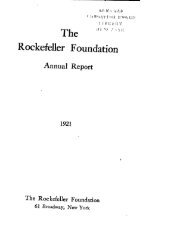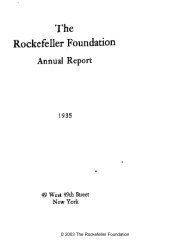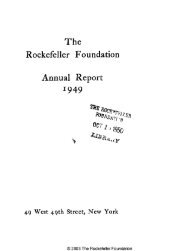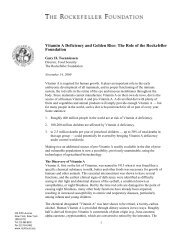Strong Ministries for Strong Health Systems - The Rockefeller
Strong Ministries for Strong Health Systems - The Rockefeller
Strong Ministries for Strong Health Systems - The Rockefeller
Create successful ePaper yourself
Turn your PDF publications into a flip-book with our unique Google optimized e-Paper software.
from a disease focused system to one that promoted primary care, public health, and increased public awareness of healthy<br />
and unhealthy behaviors. One described implementing the third stage of a pre-existing 15-year plan <strong>for</strong> the health system.<br />
All ministers interviewed noted significant challenges to fulfilling their responsibilities. <strong>The</strong>se challenges reflected some<br />
combination of:<br />
• high disease burdens (particularly in low income countries and southern Africa),<br />
• limited financial and human resources,<br />
• inadequate in<strong>for</strong>mation systems, and<br />
• partnerships that involve differentials in power and competing priorities.<br />
“As we get in below the regional level, we can see that many of the organs in the Ministry are absent or atrophied,<br />
especially in relation to operations and the regulatory function. If it’s a low resource country, they<br />
tend to be chronically underfunded <strong>for</strong> a whole variety of mandates. <strong>The</strong> problems are more visible in dealing<br />
with the underserved populations and in countries where there’s high turnover both in the political system<br />
and within the <strong>Ministries</strong>. <strong>The</strong>re is very little institutional memory. Many regions are still living with<br />
the legacy of the 80’s where government was bad. This has not really been addressed and this ideology is<br />
undermining the important understanding of the key functions of government in assuring that they’re appropriately<br />
built.” –Stakeholder, International Organization<br />
“We have lots of human resources, but they’re poorly trained. Management in the ministry was virtually<br />
zero. Letters weren’t answered – we had to get email <strong>for</strong> everybody and change the customs so they were<br />
more com<strong>for</strong>table with electronic communications. Many staff had part-time jobs outside the ministry or<br />
their own private practices; so we had to figure out how to build this into their human resources contract<br />
so that it wouldn’t be under the table.” –FMOH<br />
In the midst of so many competing demands, many ministers described defining their own agenda as a central leadership<br />
challenge. For some, this meant establishing their identity as separate or new compared to their predecessor; <strong>for</strong> others it<br />
meant identifying priorities. As noted above, many come into the job without relevant experience, training, or orientation.<br />
Lack of epidemiologic and other reliable data on population health status makes it difficult <strong>for</strong> an incoming minister to<br />
understand exactly what the health priorities should be. A good “situation analysis” of the country context was seen by a<br />
number of ministers as critical, but was often lacking (e.g. an understanding of public expectations; political commitment<br />
to health issues in general and the minister of health in particular; the tools and levers that ministers have to change the<br />
system; economic realities). In addition, the basic operational capabilities of ministries were often a challenge, exacerbated<br />
by policies of decentralization.<br />
<strong>The</strong> global agenda: Millennium Development Goals<br />
Only two ministers explicitly mentioned Millennium Development<br />
Goals (MDGs) in response to questions about their challenges<br />
and priorities. Because of the global emphasis on MDGs, this low<br />
frequency was somewhat unexpected. However, further analysis<br />
of the data revealed that many of the challenges that were explicitly<br />
identified by ministers were covered within MDG categories (see<br />
Table). <strong>The</strong> continuing dominance of attention to infectious disease<br />
often reflects the availability of financial resources through global<br />
vertical programs.<br />
Issues Cited By Ministers MDG N = 24<br />
Infectious Diseases MDG 6 15<br />
Eradicating Extreme Hunger and Poverty MDG 1 7<br />
Primary Education MGD 2 3<br />
Child Mortality MGD 4 3<br />
Maternal <strong>Health</strong> MGD 5 3<br />
<strong>The</strong> national priority: strengthening country health systems<br />
Like any successful enterprise, a strong health system is built upon a solid policy foundation; is appropriately supported,<br />
not just <strong>for</strong> maintenance of status quo, but also <strong>for</strong> growth; and is staffed by qualified individuals working in suitably<br />
equipped facilities.<br />
12 <strong>Strong</strong> <strong>Ministries</strong> <strong>for</strong> <strong>Strong</strong> <strong>Health</strong> <strong>Systems</strong>

















